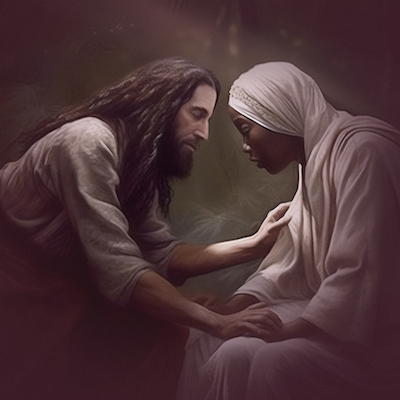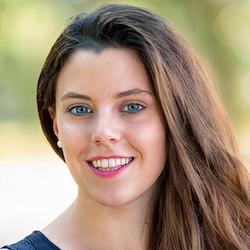
He said to her, “Daughter, your faith has made you well; go in peace, and be healed of your disease.” Mark 5: 34
 Mark 5:25-34 tells the story of a woman who has been bleeding for twelve years. She seeks medical attention, again and again, but her suffering only increases. Despite disappointment caused by physicians unable to ease her chronic pain, when she hears about Jesus, she goes to him. This unnamed woman takes the situation into her own hands, touches the hem of Jesus’ cloak, knowing that He will make her well. Immediately, the bleeding stops. And her status shifts. No longer does she go without a name. Instead, in an act of great intimacy, Jesus calls her daughter.
Mark 5:25-34 tells the story of a woman who has been bleeding for twelve years. She seeks medical attention, again and again, but her suffering only increases. Despite disappointment caused by physicians unable to ease her chronic pain, when she hears about Jesus, she goes to him. This unnamed woman takes the situation into her own hands, touches the hem of Jesus’ cloak, knowing that He will make her well. Immediately, the bleeding stops. And her status shifts. No longer does she go without a name. Instead, in an act of great intimacy, Jesus calls her daughter.
Many disability scholars critique the Christian tradition for its reliance on the brokenness-wholeness motif. This pattern, they say, connects disability and bodily limits with sin. In contrast, a body made whole signifies faith and righteousness. This message implies the impossibility of wholeness for those with chronic pain or other incurable conditions. A broken body as a sinful body entraps disabled people within a perceived “sinful state.” Christian friends may even say the disabled need only muster up a little more faith to be made well.
But Jesus rebukes the connection between disability and sin (John 9:3). Instead, Jesus’ healing acts often bring honor where there had been shame. In the story of the bleeding woman, Jesus recognizes her agency. He grants dignity by accepting her touch and giving her a name. Empowered by faith in Christ for action, the daughter claims His power as her own. Then, by drawing on Christ’s power, she finds herself healed. Wholeness is not primarily about overcoming disability or one’s location in a state of sin. The Gospel insists Christ empowers us, like the bleeding woman, to be agents of His work in the world. Indeed, our wholeness comes from participating in His life-giving power so as to be what we could not be on our own.
About Calli Micale, PhD
 Dr. Calli Micale, a theologian with a PhD from Yale, joined Palmer Theological Seminary in 2023. Specializing in ethics and theology, her research integrates Christian thought, rhetoric, and perceptions of body and health. As an ELCA ordination candidate, she blends preaching experience into courses, guiding students towards transformative perspectives on intellect, spirituality, and social justice.
Dr. Calli Micale, a theologian with a PhD from Yale, joined Palmer Theological Seminary in 2023. Specializing in ethics and theology, her research integrates Christian thought, rhetoric, and perceptions of body and health. As an ELCA ordination candidate, she blends preaching experience into courses, guiding students towards transformative perspectives on intellect, spirituality, and social justice.










